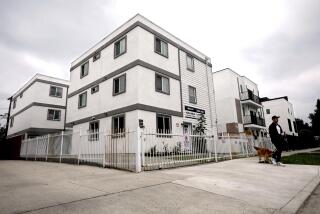Proposed Homeless Housing at Air Force Base Turns Into Battleground : Denver: Many of Lowry’s neighbors fear crime rates will rise, property values will decline and neighborhoods will deteriorate.
- Share via
DENVER — Denver’s homeless need shelter; Lowry Air Force Base--slated for closing--has housing to offer.
To advocates for the homeless, it is a perfect match. But to thousands of property owners, it is more like a nightmare, and they’re waging a battle that is more heated than anything the base has seen in its 57 years.
“Nothing’s like what we’ve run into in Denver,” said John Carr, program manager for the Air Force Base Conversion Agency, which is coordinating the closure of bases for the Air Force.
Lowry’s neighbors want a say in how their area develops. Many are afraid a concentration of homeless will cause crime rates to rise, property values to decline and neighborhoods to deteriorate.
“Most of the people in our area are humanistic. Most of us contribute quite heavily to charities, including homeless providers,” said Julie Mackay, who co-chairs United Neighborhoods Organization, a coalition of Lowry-area homeowner associations.
“We do stop short of giving up our homes and our neighborhoods. A lot of the neighbors feel like they are being asked to give more and more and more . . . they don’t feel that’s fair.”
There is no question that Denver has a homeless problem; the Colorado Coalition for the Homeless estimates the number of homeless families increased 88.5% between 1990 and 1992.
Its statistics indicate an average of 477 families--about 1,378 individuals--stayed in Denver shelters on a given night last year. That excludes single people and families who sought help privately.
Providers of housing for the homeless have top priority for surplus government property--like base housing--under the 1987 McKinney Act. So when the government announced it was closing Lowry, they saw their opportunity.
Since its opening in 1937, Lowry has been a formidable presence.
It sprawls across 1,863 acres on the border of Denver and its suburb, Aurora. In 1967, the Air Force closed its airstrip and dedicated the base to education; this year, about 21,000 students attend classes at Lowry, where 11,000 military personnel and civilians hold jobs.
An eclectic mix of residential and commercial developments surround the base, ranging from $20,000 one-story brick homes to sprawling residences on tree-lined boulevards that are worth more than $250,000.
The United Neighborhoods Organization, representing these areas, proposed that a maximum of 32 of Lowry’s 867 housing units be reserved for the homeless.
A group of citizens and government representatives went further. As part of their overall base-redevelopment plan (a 187-acre educational campus, 538 acres for housing, 36 acres for community services and more than 400 acres of recreation and open space), they recommended that the homeless get a maximum of 86 units and 87 dorm rooms.
But homeless advocates wanted more, and it seems they may get it. Tentatively, the Air Force has approved 196 units.
A final decision is expected from the Air Force in June, but meanwhile, tempers are flaring.
“To me, the hatred is the worst I’ve seen,” said Denver City Councilwoman Polly Flobeck.
Opponents have packed public hearings; letters representing both sides of the issue have appeared in the newspapers. Property owners have pledged to take their case to congressional leaders.
In addition, attorney Tom Hames and some colleagues are researching legal issues to determine if there is a basis for a lawsuit. They also are raising money to help finance a lawsuit if the debate reaches that point.
“We are not opposed to the homeless being located at Lowry. We will accept our fair share and probably a little bit more because we recognize it as a problem,” he said. “We are opposed to the base being used as a magnet for those who were down on their luck.”
But advocates like John Parvensky, director of the Colorado Coalition for the Homeless, are trying to calm their angry adversaries.
“I think there’s a lot of fear and ignorance of not knowing what we’re proposing or what the situations of these types of families are,” he said.
“We’re focusing in these programs on families, those who are truly motivated to make a difference in their lives. . . . It doesn’t do any good to place families in an environment that is destructive or debilitating.”
More to Read
Sign up for Essential California
The most important California stories and recommendations in your inbox every morning.
You may occasionally receive promotional content from the Los Angeles Times.













